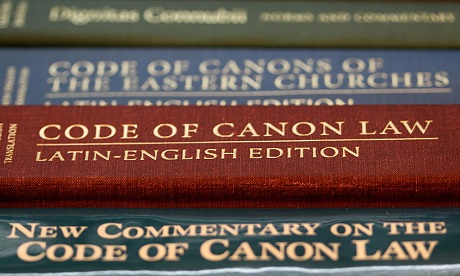The pope has updated the Church’s procedural norms for dealing with delicts – serious crimes such as schism, sacramental desecration and abuse of minors.
On Tuesday, Pope Francis publicised adaptations to the “Norms on the delicts reserved for the Congregation for the Doctrine of the Faith”.
The following day on 8 December (the feast of the Immaculate Conception) a revised version of Book VI of the Code of Canon Law went into effect.
Although the definitions of the crimes themselves have not been changed, the new version of the norms – or ways of dealing with transgressions – aligns with recent laws Francis has issued and with the revisions to Book VI.
These revisions include Francis’s motu proprios “As a loving mother” and Vos estis lux mundi.
The new norms include the possibility of the pope decreeing an individual’s dismissal from the clerical state directly, without a trial. Situations where this could occur include crimes against the faith, such as heresy, apostasy and schism.
In addition to the crimes against the faith, the doctrinal congregation also judges crimes against the sacraments.
These crimes include desecrating a consecrated host, simulating the Mass, solicitation to a sin against the sixth commandment (adultery) during confession and violating the confessional seal.
Other crimes include attempting to ordain a woman, clerical abuse of a minor and a cleric possessing child pornography.
“The changes that have been introduced mostly concern procedural aspects, aimed at clarifying and facilitating the proper conduct of the Church’s legal workings in the administration of justice,” Vatican News says.
The norms were first promulgated by Pope John Paul II in 2001 and amended by Benedict XVI in 2010.
Benedict first commissioned the revisions to improve the efficacy of the code’s penal sanctions.
Msgr. C. Michael Padazinski, president of the Canon Law Society of America, is pleased with the changes.
“This reinvigoration of canon law is a welcome necessity to our member canonists’ work on behalf of the Church and will be, as the Holy Father says, an instrument for the good of souls.
“Recategorizing the crime of sexual abuse of a minor from a delict against celibacy to a delict against the dignity of the human person is a remarkable development.
“It shows a shift from a mindset of concern focused primarily on an accused cleric to a concern for the individual who has been harmed,” Padazinski, says.
The revisions coming into effect on the feast of the Immaculate Conception is significant, he comments.
This is because the date “reaffirms that life itself and the protection of human dignity begin at the instant a child is conceived in the mother’s womb.”
Source
